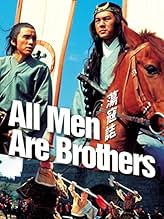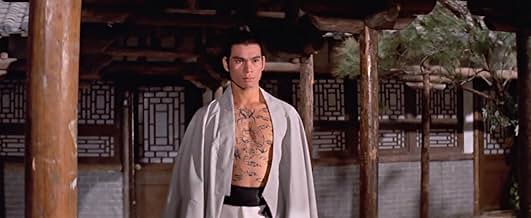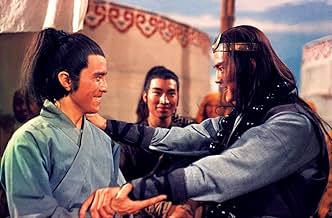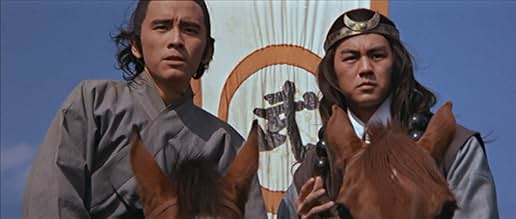Añade un argumento en tu idiomaBased on one of China's enduring epic novels, written in the 14th century, "All Men Are Brothers" continues the patriotic story of righteous warriors battling despotic leaders, featuring myt... Leer todoBased on one of China's enduring epic novels, written in the 14th century, "All Men Are Brothers" continues the patriotic story of righteous warriors battling despotic leaders, featuring mythic characters familiar to every Chinese, and with a cast that has achieved an equally cel... Leer todoBased on one of China's enduring epic novels, written in the 14th century, "All Men Are Brothers" continues the patriotic story of righteous warriors battling despotic leaders, featuring mythic characters familiar to every Chinese, and with a cast that has achieved an equally celebrated status among Shaw Brothers devotees: Ti Lung, David Chiang, Chen Kuan-tai and Dann... Leer todo
- Dirección
- Guión
- Reparto principal
- Guard
- (as Ti-Ko Chen)
- 'Twin Spears' Tung Ping
- (as Hui-Min Chen)
- Wan Tien-tso
- (as Chuan Chen)
- Li Shih-shih
- (as Betty Chung Ling Ling)
- 'Welcome Rain' Sung Chiang
- (as Feng Ku)
Reseñas destacadas
It's pretty much nonstop action from start to finish, with some of the most intricate fight scenes I've yet seen in a Shaw production. At one point, Shi Jin (Chen Kuan Tai) takes on dozens of enemy soldiers in a courtyard singlehanded. The reckless and short-tempered Black Whirlwind (Fan Mei-Sheng) was quite a lethal combatant in THE WATER MARGIN, but he's even more ferocious here, wielding his battle axes to bloody effect in one encounter after another as he cuts a swath through the onslaught of attacking soldiers, who are dwarfed by his massive presence. Also on hand are David Chiang, Wang Chung, Danny Lee, Wong Kwong Yue and the one female in the group, Yue Fung, as Sun the Witch. The rebel prince and his cadre of generals are quite a crafty and formidable group of foes, so the suspense level is high. The film makes ample use of the Shaw studio's massive backlot built for period epics. The music score is much better than the patchwork collection of random, sometimes dissonant, cues used in THE WATER MARGIN.
I had written a review of this film for IMDB back in 2001 after seeing a VHS copy of its shortened, English-dubbed version, SEVEN SOLDIERS OF KUNG FU. After re-watching the film on Celestial's R3 DVD this week for the first time in nearly ten years, I came here to check my original review, but it seemed to have disappeared from this site, so I wrote this one, especially since my original review was mixed and, I believe, somewhat unfair to the film considering the copy I had to view back then. Well, the original review is back on site now, complete with a positive addendum I added in 2010. So now I have two reviews of it here. In any case, I highly recommend the film.
It opens with a lady playing the lute. David Chiang joins in and pretends to play the flute. The lady is the emperor's side piece. She gets the emperor to sign a pardon. David is one of the famous 108. They are criminals and rebels but they actually support the emperor and rebel against corrupt government officials. Unofficially, the emperor supports this activity since he has their loyalty. Many of the 108 have extensive backstories but this movie doesn't have the time to get into details.
The outdoors set is glorious. This is Shaw Brothers studios at Clearwater Bay at its high point. The big bridge is there, this time without side rails. There is the seven story pagoda, the big wall, the town, the hill from the wall to town, the area called Tiger clan headquarters, and a new wall waterside. This area was used many times in many movies and parts are seen for the last time. The waterside is new and prominently featured here.
The greatest action directors in the history of these movies continued being great in this movie. The fight choreography displayed little realism but instead show-off moments where the heroes faced overwhelming opponents and fought on for revenge and glory. The most noteworthy fights include David Chiang wrestles Bolo and chokes him out. Chen Kuan-Tai, covered in Sharpie tattoos, fights using a log, then a bench, and dies a good death. Fan Mei-Sheng has a long and good fight also. I rate it as my favorite. Ti Lung finally gets his fight near the end and loses an arm. Would it be a spoiler to mention a good alternate title would be "All Men are Dead Brothers"?
I rate it above average and consider it mandatory viewing for fans of martial arts movies of the golden age from 1967 to 1984.
The fast pace and pivot away from a narrative focus means the film can be a bit of a whirlwind when it comes to understanding many plot details, but after a while, you sort of settle into the basics. At that point, the non-stop action is enjoyable, sure, and also made a little more impactful by the stakes that are established hurriedly and sporadically throughout the first act.
It reminded me of John Woo's excellent Last Hurrah For Chivalry, with its level and frequency of violence, but Woo's film had a better story and slightly more creative action. The choreography here is still good, of course, and I loved the frenetic camerawork present in some scenes (made me think of the Battles Without Honor or Humanity series, of all things). Also a bit Woo-esque: the way this indulges in heroic bloodshed, or whatever the martial arts equivalent of that sub-genre is. It's not afraid to hurt or even kill its heroic characters, making sacrifice a theme that shines through by the end, even if the storytelling doesn't do much heavy lifting to make that stuff truly emotional.
¿Sabías que...?
- ConexionesFeatured in V.I.P.-Schaukel: Episodio #4.2 (1974)
Selecciones populares
Detalles
Contribuir a esta página

































